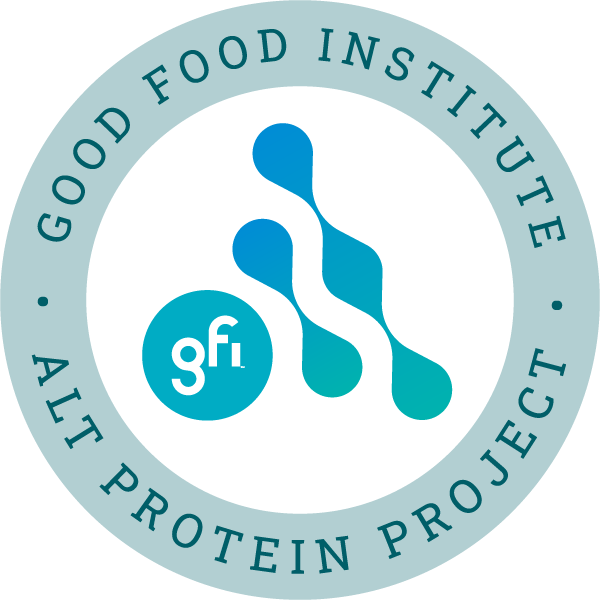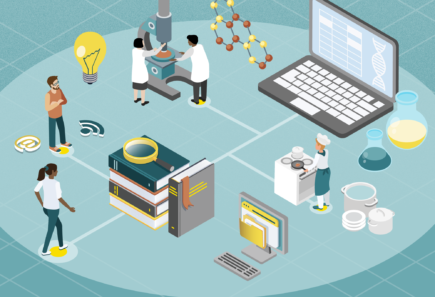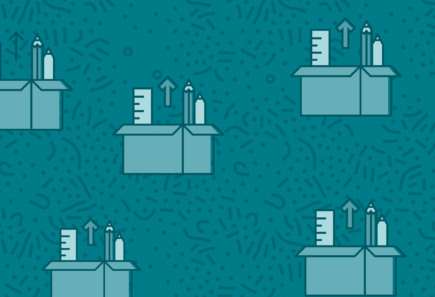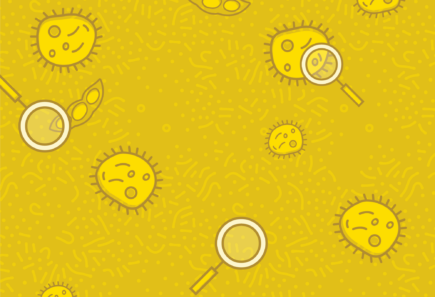
The Alt Protein Project
Students play a pivotal role in building the alternative protein ecosystem. Learn about how you can start a student group at your university to accelerate the global transition to the future of food.
What is the Alt Protein Project?
The Alt Protein Project is a global student movement dedicated to turning universities into engines for alternative protein education, research, and innovation. Students at all stages of their training, from first-year undergraduate students to graduate students about to defend their dissertation, are the driving force behind the Alt Protein Project, which is building momentum at universities around the world.
The world of alternative proteins
Alternative proteins are meat, seafood, eggs, and dairy products produced from plants, animal cells, or using fermentation. These innovative foods are designed to taste the same as or better than conventional animal products while costing the same or less, giving people the foods they love without the need for industrial animal agriculture.
Driving alternative protein development at universities
Even students who are excited and motivated to join the alternative protein field are often unaware of the critical role they play in defining the trajectory of our food system from within the university.
Students are the catalysts who can shape university priorities. From driving scientific inquiry that improves the sensory and functional qualities of new protein products to creating educational programs and establishing a talent pipeline for a growing industry, universities are becoming a cornerstone of the alternative protein ecosystem.
The Good Food Institute established the Alt Protein Project so that motivated, visionary students could lead their universities to support the transformation of the food system to one that is sustainable, secure, and just.
New fields, especially those that are interdisciplinary by nature, flourish when all stakeholders have the opportunity to connect and cooperate. The project is all about creating connections — between tissue engineers and food scientists, entrepreneurial business students and technical innovators, principal investigators, and the next generation of research talent.
Most importantly, the Alt Protein Project connects members with the right ideas, questions, and opportunities that will help accelerate a global transition. The result is a network of academic institutions that prioritize plant-based, cultivated, and fermentation-enabled protein. This network helps provide this growing alt protein sector with the institutional resources and human ingenuity it needs to scale and feed the world sustainably.
How we support our student leaders
As leaders in the Alt Protein Project community, you will receive direct mentorship and training from the expert scientists and field catalysts at GFI. Each group is paired with a mentor from their region to provide strategic insight and to foster connections with local stakeholders.
We connect alternative protein scientists, entrepreneurs, and other innovators across the world. We tap into our network to showcase and amplify the impact of our student groups. In addition to maintaining a collection of resources for students, we work closely with members of the Alt Protein Project to provide strategic mentorship, guidance, and ad hoc support. Alt Protein Project members have access to a Slack workspace where our staff answer questions and stimulate innovative discussions. And, of course, student leaders in the workspace support one another and celebrate shared successes!
Once a month, we host a student leader call that serves as a forum for connecting our global community. These calls include roundtables, training from alternative protein experts, collaborative problem-solving sessions, and networking activities. Each active student group is also eligible for grants to support group projects and activities, in addition to the funds student groups can raise independently. Additionally, we will work with student leaders to help amplify news about student group events, campaigns, and other public-facing projects across our network.
Meet our student groups
Since 2020, we have established student groups at more than 70 universities around the globe that are well-positioned to lead the alternative protein revolution. Each group has members from different disciplines and academic stages working together to define and launch the high-impact initiatives needed for alternative proteins to succeed. Dive into our student group directory to explore how students are building alternative protein ecosystems on campus from Stanford to Wageningen, Delhi to Melbourne.

University of California – Berkeley
Active

EIT Food
Inactive

North Carolina State University
Active

University of California, Los Angeles
Active

University of Wisconsin-Madison
Active

Appalachian State University
Inactive

Ashoka University
Active

Aston University
Active

The University of Texas at Austin
Active

Basque Culinary Centre
Inactive

University of Bayreuth
Active

TU Berlin
Inactive

University of Novi Sad, Serbia
Inactive

University of Colorado, Boulder
Active

Brown University
Active

Boston University
Active

University of Cambridge
Active

University of North Carolina at Chapel Hill
Active

Columbia University
Inactive

Cornell University
Active

Colorado State University
Inactive

University of California at Davis
Active

Technical University of Denmark
Active

Duke University
Active

Ecole Polytechnique Fédérale de Lausanne (EPFL)
Active

ETH Zürich
Active

University of Exeter
Inactive

Institute of Chemical Technology, Mumbai
Active

Indian Institute of Technology, Bombay
Inactive

IIT Madras
Active

University of Illinois at Urbana-Champaign
Active

Imperial College London
Active

Johns Hopkins University
Active

KU Leuven
Inactive

University of Lisbon
Active

McMaster University
Active

University of Melbourne
Active

Colorado School of Mines
Active

National Institute of Food Technology Entrepreneurship and Management – Kundli
Active

Norwegian University of Life Sciences
Inactive

Norwegian University of Science and Technology
Active

Nanyang Technological University
Active

National University of Singapore
Active

Nanyang Polytechnic
Inactive

New York University
Inactive

University of Oxford
Inactive

Pennsylvania State University
Active

University of Regensburg
Inactive

San Diego State University
Active

Université de Sherbrooke
Inactive

Seoul National University
Active

Stanford University
Active

Texas A&M University
Active

Tel Aviv University
Inactive

University of Tokyo
Inactive

Tufts University
Active

Technical University of Munich
Active

Pontificia Universidad Católica de Chile
Active

University of Chicago
Active

University College London (UCL)
Active

Universidade Federal de Minas Gerais (UFMG)
Active

Universidade Federal do Paraná
Active

Federal University of Santa Catarina
Active

University of Massachusetts Amherst
Active

Sao Paolo State University (UNESP)
Active

UNICAMP
Active

University of Delhi
Active

University of Nigeria
Active

University of Toronto
Active

Universidad Nacional de San Martín (UNSAM)
Active

University of New South Wales
Active

University of Pennsylvania
Active

Universiti Sains Malaysia
Active

Universidade de São Paulo
Active

Utrecht University
Active

The University of Vermont
Active

Virginia Tech
Active

Wageningen University and Research
Active

University of Warwick
Active

University of Waterloo
Active

Yeditepe University
Active
81 Chapters

Explore our student group resource hub
In partnership with our community of university ecosystem-builders, we created this resource hub to help you identify the highest-impact actions to undertake on campus and use them to meaningfully advance the alternative protein sector. Explore this repository of helpful tools, templates, tips, and tricks to build a thriving alternative protein ecosystem at your university.
See our student leaders at work
The Alt Protein Project is much more than a social group. It provides students and researchers with an interdisciplinary community in which to explore the alternative protein-related applications of their academic expertise. At each host institution, student leaders work with GFI experts to build initiatives that will have the greatest impact on growing their own school’s alternative protein ecosystem.
The Alt Protein Project has been empowering student leaders since 2020 to help build their universities into vanguards in the alternative protein sector. Our community has spurred the creation of more than 20 courses and modules, 40 research projects, and 50 jobs and internships dedicated to alternative proteins, with plenty more to come!

Impact stories of the Alt Protein Project
Explore the global impact of the Alt Protein Project (APP) through compelling data and inspiring stories from APP chapters around the world.
Objective 1: Building alternative protein courses and majors

One of the largest bottlenecks in the alternative protein field is the relative lack of scientists and engineers who can advance plant-based, cultivated, and fermentation-enabled meat, egg, and dairy products. The Alt Protein Project works to create and support alternative protein courses, tracks, and programs. Student leaders work with GFI experts and university faculty to design course materials and advocate for curriculum development.
Student leaders from the Johns Hopkins Alt Protein Project designed a course dedicated to Future Food Manufacturing. In addition to instruction in cutting-edge engineering and food science, student leaders forged partnerships with alternative protein companies to give all class participants practical experience with tackling a real-world obstacle.
Objective 2: Stimulating open-access research

The alternative protein field needs more scientists driving open-access academic research for better alternatives to conventional meat, egg, and dairy products. Student leaders play a pivotal role in catalyzing open-access research by inspiring academic collaborations, designing research proposals, laying the foundation for research centers and consortia, keeping labs abreast of new funding opportunities, and pursuing their own lines of scientific inquiry.
Dr. Stephanie Kawecki co-founded the Alt Protein Project at UCLA when she was pursuing her Ph.D, having been driven to use her training in bioengineering to help fix one of the most glaring problems she saw in the food system around her since the beginning of her scientific career. She approached Dr. Amy Rowat and campaigned for the inclusion of cultivated meat in her research portfolio. Her student advocacy opened the door to Dr. Rowat becoming a GFI grantee and securing significant follow-on funding from the USDA and NSF.
Objective 3: Catalyzing alternative protein entrepreneurship

The Alt Protein Project empowers student entrepreneurs to start alternative protein companies that address key commercial white spaces whose solutions will help propel the industry forward. Students can do this in a myriad of ways—by working with alternative protein experts to analyze white space opportunities and develop product prototypes, mobilizing their peers through regional innovation challenges, building alternative protein tracks in student accelerators, and more!
Student leaders at the NMBU Alt Protein Project saw an absence of a physical space that would allow professors, companies, and students to learn, develop, and test their food products. They worked within their university to bring their Food Pilot Plant to reality and ensured alternative proteins feature prominently in its industrial and social output.
Objective 4: Generating awareness and excitement

The Alt Protein Project organizes events and conferences to stimulate discussion, cultivate new ideas, and get people excited about opportunities in alternative proteins. Generating enthusiasm on campus means that more students can take advantage of the university environment to explore alternative protein white spaces, both within and beyond the Alt Protein Project.
Media moguls from the EIT and Wageningen Alt Protein Projects created podcasts to engage with the biggest topics and news in the alternative protein sector.
Objective 5: Creating an inspiring, inclusive community

The Alt Protein Project provides students and researchers with a fun, fulfilling, and inclusive community in which to explore questions and opportunities around alternative proteins. AltPro groups welcome a diverse and interdisciplinary membership to spur novel thinking, break down academic silos, and foster collaboration.
The Duke and Chapel Hill Alt Protein Projects collaborated to host a first-of-its-kind conference dedicated to “Making Alt Proteins the New Default.” With speakers from alternative protein startups, research programs, and government initiatives, their event triggered new career trajectories and professional collaborations for its more than 150 attendees.

Resource
Get involved with the Alt Protein Project
Interested in bringing the Alt Protein Project to your university? Learn about what we look for in our student leaders and register your interest to stay informed about program updates…

Become an industry partner with the Alt Protein Project
Thank you for offering to be an industry partner for our global community of alternative protein educators and student leaders!

Join the alt protein educator community
Join our alternative protein educator community and help bring alternative protein education into classrooms around the globe.




Check out upcoming events
Connect with us
If you would like help growing the alternative protein ecosystem at your university, please reach out to the Alt Protein Project team. You can also share student testimonials or helpful tips for our global community of alternative protein ecosystem-builders. Be sure to follow us on LinkedIn for the latest news and events!








